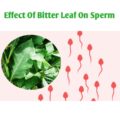
Akamu (Pap, Ogi, Corn Porridge) is a thick, creamy, and silky smooth breakfast porridge made mostly from fresh corn, guinea corn or millet. Traditionally, the grains are soaked in water for up to three days, before wet-milling and sieving to remove husks. The filtered cereal is then allowed to ferment for up to three days until sour. It is then boiled into a pap, or cooked to make a creamy pudding. It may be eaten with moin moin or akara.
The most important attribute of indigenous food like akamu is that they are nutritiously rich. Studies have shown that the fermentation process involved in the making of Akamu enhances the nutrient content of the food through the synthesis of proteins, vitamin, and essential amino acids.
What is Sperm Count?
If you and your partner are trying to conceive a baby, you may be looking for information about how to increase sperm count to improve your chances of getting pregnant. A healthy sperm count is necessary for fertility. For pregnancy to occur, only one sperm and one egg are needed, so why does sperm count matter? In short, it increases the odds for a successful pregnancy. When a man ejaculates into a woman, the chances that one sperm will reach and implant itself into an egg increases if more sperm are in the semen.
Normal semen contains 40 million to 300 million sperm per milliliter. A low sperm count is considered to be anything between 10 and 20 million sperm per milliliter. Twenty million sperm per milliliter may be adequate for pregnancy if the sperm are healthy.
Few people know that the average man’s sperm count has dropped steadily over the past 40 years. This fact should scare everyone, especially men. However, sperm health is the last thing on the minds of most men. How nutrition impacts sperm is even farther away from our collective consciousness.
So why is the quality of sperm decreasing? Is this really a problem? Can we blame it on foods we’re eating? This post tackles these questions and shares some sperm-friendly nutrition tips.
Is declining sperm quality really a problem?
Yes, it’s a problem. A recent study states that average sperm counts have dropped by 59 percent over the past 38 years. With this drop in mind, it’s not surprising that the Centers for Disease Control and Prevention website states “in about 35 percent of couples with infertility, a male factor is identified along with a female factor.” Falling sperm counts, combined with the trend of having children at later ages, means that some couples will face difficulties with fertility.
Why are sperm counts dropping? Is our diet killing sperm?
No one knows why sperm counts are falling precipitously. Some say sperm are vanishing due to men resting laptops on their laps. Others blame the heat generated from cell phones sitting in pants pockets. Obesity is a likely factor. The doctor in me knows that the drop is likely due to a variety of factors. What we eat is always a culprit for any health problem. Accordingly, several studies suggest that consuming certain foods may harm sperm. The good news is that there are also foods that may increase sperm count.
Does Akamu Increase Sperm Count?
Akamu has several health benefits, anecdotal evidence in Nigeria suggests that akamu is combined with fresh egg milk and honey to boost sperm count. Eggs are high in Vitamin B12 and Selenium which is essential in the generation of tissue around the testicles. They are also a good source of antioxidants which helps protect the sperm from damaging free radicals and improve motility. The nutrients present in an egg, help in the production of stronger and healthier sperm and improve fertility.
Studies have also shown that low-fat milk intake, particularly low-fat milk, is related to higher sperm concentration. Honey, also known as an aphrodisiac, has been reported to increase sperm count, testosterone and libido level. It contains glucose and fructose, which may be used by the body to obtain energy, thereby improving sexual virility.
In conclusion, cereal based foods like akamu is an easy way to load up on a host of good-for-you nutrients, including folic acid and zinc. Researchers have found that the men with fertility problems who took 5 mg of folic acid a day and 66 mg of zinc sulfate a day for 26 weeks had a 74% increase in total normal sperm count and a minor (4%) increase in abnormal sperm count. A separate study of 211 men published in Fertility and Sterility also found that supplementing with zinc and folic acid can increase sperm count in both fertile and sub-fertile men. ALSO READ: Does Akamu Make You Fat?
Conclusion
If well prepared with the appropriate sperm boosting nutrients, akamu can help increase sperm count and fertility. This can help overcome issues of subfertility (delay in conceiving) traced to men.





